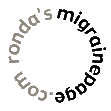
|

|
||||||||
|
Children and MigrainesOne of the hardest things for a parent to do is to see his or her child in pain. Unfortunately, as many of you know, migraines tend to be hereditary. The age of six is when children may start getting migraines, although they have been diagnosed in children as young as two. If you or your spouse suffer from migraines, and your child starts getting headaches, there is a good chance they may have inherited them. Frequent headaches in children, while not all that uncommon, should be checked out by a doctor in order to rule out any problems and find possible causes. Working with a doctor can also help you find an effective form of treatment for your child. Diagnosing headaches in children is sometimes difficult because, especially at a young age, children may have difficulty describing exactly what symptoms their headaches have, or determining correlations between events, foods, etc. and the onset of the headache. Therefore, the input of parents, friends, siblings, etc. can be greatly beneficial to the doctor in order to obtain a more complete picture of the headache problem. Keeping a diary (which your child can help maintain), can help your doctor to determine possible triggers, and see the headache pattern more clearly. It's been estimated that head pain accounts for more than a million lost days of school every year. Children may get headaches from triggers similar to those for adults. Other triggers for children could be a change in their school environment, change in hormone level in adolescence, and events such as a big game, a trip, birthday party, etc. Migraine symptoms in children are similar to those of adults, but the headache may not be as prounounced, with other symptoms (such as nausea, stomach cramping, sensitivity to light and sound, and diarrhea) being more problematic. Also, children tend to have migraine on both sides of the head, while in adults, the headache is usually confined to one side. When children suffer from migraines, non-drug treatments are usually tried first. This can include adjusting your child's sleep schedule so that he or she awakens at the same time each day (even on weekends), trying to stick to as regular a schedule as possible, and keeping a diary of food consumed, activities, sleep patterns, etc. to map out possible triggers. High-salt and high-sugar foods may be triggers in children. Cutting down on these foods may help the problem somewhat. Try removing possible trigger foods from your child's diet and replacing them one by one to see which may be causing the headaches. Getting your child to lie down in a dark, comfortable room and applying an ice pack to his or her head may also help relieve some of the headache symptoms. Clinical treatments include biofeedback and relaxation techniques to help the child control the severity of the headache. Counselling and peer groups may also help the child to understand what headaches are all about, and make him or her feel more comfortable in dealing with them and explaining them to friends, teachers, etc. Many children who get migraines are very active and can get depressed when the headaches interfere with their normal activities. Talking to counsellors and other children with migraines can help alleviate some of this stress. Consult with your child's doctor before starting any form of treatment!! Childhood migraine can cause a lot of suffering to the child with the headache, as well as to parents and siblings. While it's an unfortunate aspect of life, there are treatments which may help, and often times children seem to "grow out of" the migraines by adolescence (especially males). Some useful sources of information on the net are:
Resources: Sites listed above Freedom From Headaches, Joel R. Saper, MD and Kenneth R. Magee, MD DISCLAIMER: This website is intended to provide a forum for the free exchange of information only. The maintainer of this site in no way sponsors, supports or condones any of the advice given herein, nor supports the use of any medication, supplement, herb, substance or program, except pursuant to a licensed medical practitioner's care. In no way does the maintainer of this site advocate the use of any illegal medication, herb, supplement or other substance or the importation, distribution or sale thereof. Persons who have any question about the legality of any action that they are planning to take are advised to consult an attorney. |
[Home] [On-Line Journal] [On-Line Discussion] [Chat]
[Support] [Definitions] [Medicine] [Art & Poetry] [Resources]
© 1996, Ronda Solberg, ronda@migrainepage.com